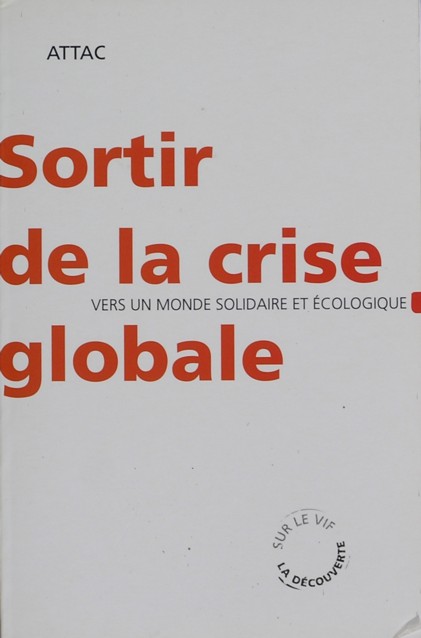

Sortir de la crise globale has been written by Jean-Marie Harribey and Dominique Plihon, and is published under the auspices of the Association pour la taxation des transactions pour l'aide aux citoyens (in short Attac). The organization Attac deserves some elucidation. After the collapse of the Leninist regimes at the beginning of the nineties many of the radical activists became organizationally homeless. In 1998 they founded Attac, first in France, to build a new home1. Although its name suggests that it merely propagates the Tobin tax, its field of operation is actually much wider. Anything which is somehow related to the economy, can count on the interest of the Attac members. The popularity of Attac differs for each state. In France it is quite large, in Germany it is also fairly active2, but in the Netherland it is almost absent, despite efforts of a few SP leaders.
Attac has the ambition to be a scientifically credible organization. However, its publications are commonly anti-capitalistic, so that their ideology is one-sided and somewhat misleading. Nevertheless, they sometimes contain interesting information, and Sortir de la crise globale definitely belongs in this category. Your reviewer read the book six years ago, together with various other radical-left literature. The authors see no less than three crises, namely an economic, ecological and democratic one. Each of these crises blocks the maintenance of capitalism. The authors evidently give a prominent place to the financial crisis, which erupted in 2008. They extensively discuss the causes of the financial crisis, and precisely this analysis makes the book interesting. Incidentally, there would also be other crises due to the social austerity, food, and the climate.
According to the authors the profitability of capital falls. The capitalists try to combat this development by introducing more market systems, and notably also in the public sector. Capital becomes global, and tries to find new investments in the economically emerging states. This flow of capital reduces the wage level in the west. The state tries to stabilize the consumptive demand by means of asset-based Keynesianism (p.59). That is to say, demand for property titles is created by granting credits3. Therefore the prices of titles rise, so that the owners can again borrow money with the property titles as a security. This mechanism obviously ends, as soon as the credibility is hurt. The end of the solvency can lead to instabilities, resulting in a crisis. This indeed happened in 2008.
A part of the property titles consists of mortgages, which have been partly combined in complex new financial products, such as collateralized debt obligations (p.83). Thus it is attempted to reduce the speculative risk, which evidently failed in 2008. The authors, being seasoned else-capitalists, reject such innovations. They believe that the productive enterprises become subordinate to the interests of capital. Thus the global economy ends in a slump. The authors state that the problems can not be solved within the existing system, by a technological revolution. This will fail. Those who state that the ecological crisis is an economic opportunity, play down the problems (p.110). A bio-economic approach is required. The financial sector must again become servicable (like during the sixties), and the social and ecological policy must get priority (p.118).
This implies for the financial sector, that a stringent democratic supervision will be installed. This includes a strong state, which directly controls the central bank. Finance is a political task. At the global level the United Nations become the highest authority, also for the trade and finances. The workers must co-manage in the enterprises4. The income inequality is limited to a ratio of 1:5, with as the bottom an unconditional basic income. Etcetera. Whereas the preceding analysis was interesting, albeit one-sided, Attac gets carried away by a wild utopianism in its policy proposals, and thus opens the door to a mighty repressive alliance of states, similar to the Leninist Comecon (Council for mutual economic cooperation)5. Your reviewer shakes his head. This is too much. In conclusion, the reader may decide by himself whether the radical-left Attac view in this book is worth studying.